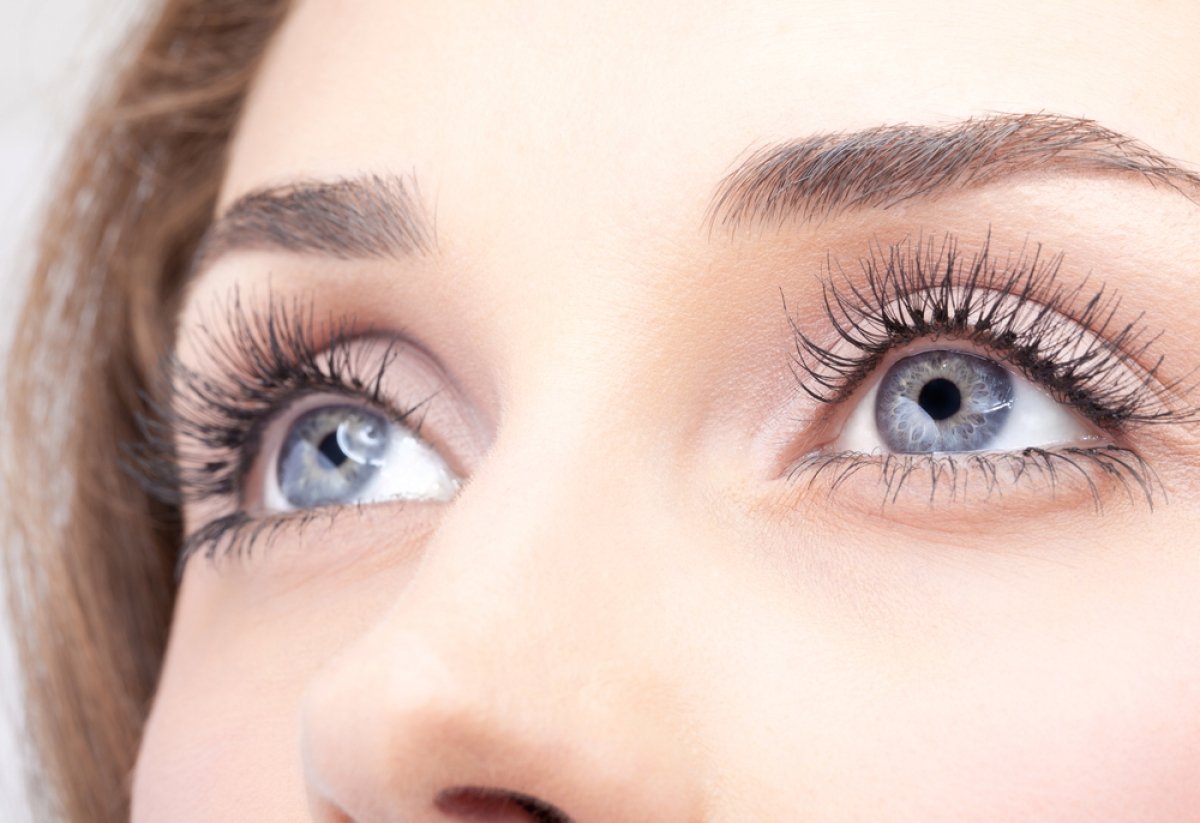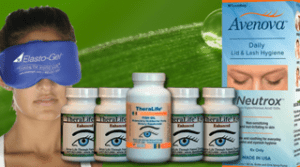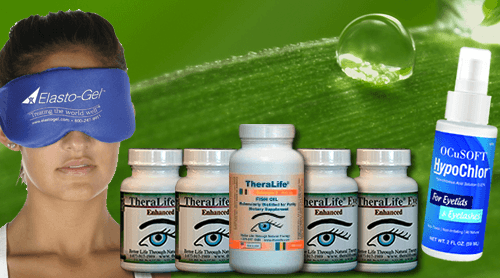Blepharitis Causes
Blepharitis is a common medical condition characterized by inflammation of the eyelids. It can cause redness, itching, and irritation in the eyes and around the edges of the eyelids. While it is typically not serious, blepharitis can be uncomfortable and inconvenient for those affected.
The exact blepharitis causes are still unknown; however, research has identified several potential triggers which may contribute to its onset. This article will explore five surprising causes of blepharitis and offer advice on preventing them.
Bacterial Infection- Blepharitis Causes
Bacterial infection is one of the most common blepharitis causes. Understanding how bacteria can lead to such an eye condition is essential.
It starts with a microscopic creature called Demodex mites that live on skin and eyelash follicles. These invisible critters feed off oils produced by sebaceous glands in our skin, which leads to an imbalance in the production of these oils – resulting in inflammation and irritation around the eyes.
As well as demodex mites, autoimmune disorders like rosacea or psoriasis may also contribute to eyelid infections if left untreated.
Although bacterial infections are linked with blepharitis, there are steps we can take to prevent them from occurring in the first place. Regularly cleaning eyelids and lashes with warm water and baby shampoo can help reduce symptoms of this condition.
Additionally, using artificial tears regularly might be beneficial for people who suffer from dry eyes since they lubricate the surface area of your cornea- reducing any potential discomfort caused by bacterial infection. Taking proactive measures now can go a long way towards avoiding further complications.
The next step in unraveling this problem looks at allergies and irritants that could trigger blepharitis symptoms.
Allergies And Irritants- Blepharitis Causes
Allergies and irritants are joint blepharitis causes.
Contact lens use can lead to an allergic reaction called giant papillary conjunctivitis, an inflammation of the eye’s inner lining that often leads to eyelid irritation and swelling.
Environmental pollutants such as smoke, dust, pollen, and air conditioning can also cause blepharitis due to their ability to trigger allergies or irritate the eyes and lids.
Exposure to these allergens can lead to redness, burning sensation, itching, tearing up of the eyes, dry skin around the eyes, flaking of the skin near the eyelashes, swollen eyelids, and crusting along the lashes or in-between them.
Prevention measures for allergies and irritants include wearing wraparound glasses outdoors when exposed to environmental pollutants; regularly changing contact lenses; cleaning contact lenses properly with contact solution; avoiding direct exposure to the wind if sensitive; using artificial tears; taking antihistamines for seasonal allergies; washing pillowcases frequently; keeping windows closed during allergy season; using HEPA filters indoors to reduce airborne particles such as dust mites or pet dander.
One may reduce their risk of developing blepharitis by implementing preventive methods against allergens and irritants.
Dry eyes and lack of lubrication are two other significant contributors to this condition.
Its symptoms typically involve watery vision accompanied by stinging sensations inside the eyes.
Blepharitis occurs because there is not enough moisture produced by the tear glands next to each eyeball.
Treatment options involve increasing the lubricating fluid available by supplementing it via over-the-counter drops or visiting a doctor who might prescribe medication specifically designed for treating dry Eyes Syndrome (DES).
In addition, lifestyle modifications like limiting screen time from devices such as phones/tablets or computers will help prevent further damage caused by extended periods of staring at digital screens without blinking correctly.
Dry Eyes And Lack Of Lubrication- Blepharitis Causes
1. Dry eyes and lack of lubrication, known as blepharitis, can have a variety of causes, including environmental factors, poor hygiene, hormonal changes, and other health conditions.
2. Common signs of blepharitis include redness and irritation in the eyes, burning sensation, itching, watery eyes, blurred vision, and difficulty wearing contact lenses.
3. Additionally, dry eyes can be caused by certain medications, such as antihistamines, decongestants, antidepressants, and birth control pills, as well as by certain medical conditions and lifestyle factors.
4. To prevent dry eyes, it is essential to practice good hygiene, avoid smoke and other environmental irritants, and use eye drops and artificial tears as needed.
Recent advances indicate oral treatment for dry eyes can stop blepharitis recurrence.
Causes Of Dry Eyes
Dry eyes are a common condition that can cause discomfort, redness, and fatigue.
The most common causes of dry eyes include insufficient tear production, contact lenses, and environmental factors such as dust or wind.
Contact lenses may trap air against the cornea’s surface, leading to irritation and decreased lubrication. Additionally, contact lenses can reduce the amount of oxygen reaching the eye, leading to increased tear evaporation.
Environmental factors like dust or wind may also contribute to increased evaporation by drying out the eye’s natural tears.
It is essential to avoid contact lenses to prevent dry eyes from occurring. Limit exposure to environmental conditions that could further irritate the eyes.
Regular breaks during computer work or reading can also be beneficial for reducing ocular strain caused by dry eyes.
Signs Of Lack Of Lubrication
When eyes lack lubrication, sure signs may become apparent. These may include irregular blinking or an increased feeling of eye fatigue.
As the cornea becomes dry, it may lead to a sensation of grittiness in the eye accompanied by pain and discomfort – which can cause severe redness and swelling, indicating damage to the ocular surface due to inadequate tear production.
If left untreated, these symptoms can worsen, leading to further vision impairment and even loss of sight. Furthermore, when tears evaporate rapidly, they leave behind irritating particles on the ocular surface, exacerbating conditions such as blepharitis or conjunctivitis.
For this reason, it is important to identify signs of decreased lubrication early so appropriate treatments can be administered promptly.
Poor Hygiene Practices- Blepharitis Causes
In stark contrast to the effects of dry eyes and lack of lubrication, poor hygiene practices can also lead to blepharitis. Poor diet and bad sleep habits are two major contributors that should avoid to prevent this condition from developing.
The first is an often overlooked factor but one that has a direct impact on overall health. Eating a balanced diet with plenty of fruits, vegetables, lean proteins, and whole grains helps maintain healthy tear production and reduce inflammation- a blepharitis causes.
Sleep deprivation affects both physical and mental well-being; research suggests it can increase stress hormones which may contribute to the development of blepharitis or exacerbate existing cases. Getting at least seven hours of quality rest each night is vital. In addition, making sure you take regular breaks throughout the day when working or studying helps reduce eye strain and other symptoms associated with blepharitis.
Finally, maintaining good hygiene practices such as washing your eyelids regularly with warm water or using mild face washes will help keep your eyes free from bacteria and debris buildup, preventing further irritation or infection from taking hold. Properly caring for contact lenses according to instructions provided by their manufacturers is another crucial step in avoiding potential complications related to this condition.
As hormonal changes can also play a role in its onset, proper nutritional support through supplements may provide additional protection against future flare-ups of blepharitis.
Hormonal Changes- Blepharitis Causes
Hormonal imbalances can profoundly affect the body, and one such area that can be affected is the eyes- e.g., a critical factor in blepharitis causes.
Blepharitis, an inflammation of the eyelids, is one of the most common eye conditions linked to hormonal imbalances.
Menopause, a natural transition in a woman’s life, has been linked to a higher risk of blepharitis due to hormone level changes.
Some medications used to treat menopause symptoms may also increase the risk of developing blepharitis.
Hormonal Imbalances
Blepharitis is a common eye condition that can cause inflammation of the eyelids. A major blepharitis causes.
One surprising factor that may contribute to this condition is hormonal imbalances, which fluctuations in endocrine hormones can cause.
These hormone shifts are often associated with conditions such as diabetes and thyroid disease, which affect blepharitis risk.
Changes related to menopause or puberty may also increase the chances of developing blepharitis due to their impact on hormone levels.
To reduce the likelihood of experiencing these episodes, individuals should seek medical advice if they experience any signs or symptoms associated with hormonal imbalance.
Taking preventative measures such as dietary and lifestyle changes may also help ward off potential issues stemming from endocrine disruptions.
Menopause Effects
Menopause is a considerable blepharitis caused by women after the age of 50. Menopause is a natural process in which the reproductive hormones estrogen and progesterone decline. During this period, significant shifts in hormonal levels can lead to changes in overall health.
One of these effects includes sleep disturbances, as decreased estrogen and progesterone can disrupt an individual’s sleeping pattern. Because of this disruption, many women experience fatigue during menopause due to reduced quality and quantity of rest.
Individuals going through the menopausal transition experience sleep troubles and skin reactions such as dryness or irritation – the decrease in hormone production, which affects the body’s ability to retain moisture.
Consequently, it is essential for those experiencing menopause symptoms to take preventative measures by maintaining healthy lifestyle habits, such as drinking plenty of water throughout the day.
Stress And Anxiety- Blepharitis Causes
Stress and anxiety cause blepharitis. Mental health is essential in determining how susceptible someone might be to this condition.
Studies indicate that sleep deprivation, which can result from stress or anxiety, may also increase susceptibility. Furthermore, there seems to be a correlation between higher levels of stress and more severe blepharitis causes as opposed to mild cases.
Individuals dealing with high-stress levels should take steps towards better mental health management, such as seeking counseling or relaxation techniques. Additionally, it is essential for those suffering from anxiety-related sleep deprivation to seek treatment for both conditions to reduce their blepharitis risk to manage blepharitis.
The best way to prevent these conditions and reduce one’s chances of acquiring blepharitis is by taking proactive measures such as getting enough restful sleep every night, engaging in regular physical activity, and eating a balanced diet rich in necessary vitamins and minerals.
Nutritional deficiencies will need further examination when discussing potential causes of blepharitis.
Nutritional Deficiencies- Blepharitis Causes
Nutritional deficiencies can present with various symptoms, ranging from fatigue, dizziness, and headaches to hair loss and brittle nails – this can contribute to essential blepharitis causes.
Common causes of nutritional deficiencies include inadequate dietary intake, malabsorption, and certain medical conditions.
It is also essential to consider the effects of medications, environmental toxins, and lifestyle choices on nutrient levels.
Understanding the causes of nutritional deficiencies can help individuals to make informed decisions about their dietary and lifestyle habits to optimize their health.
Symptoms Of Nutritional Deficiencies
Nutritional deficiencies can lead to various symptoms, including skin rash and eye fatigue.
Skin rashes are one of the most common signs of nutritional deficiency. They may be caused by various B vitamins, such as biotin or thiamin, which affect the growth and development of healthy skin cells. In addition, nutrient deficiencies in iron, zinc, or vitamin C can cause an itchy or scaly skin rash aggravated by environmental exposure.
Eye fatigue is another symptom associated with certain kinds of nutritional deficiency. Vitamin A, for example, is necessary for good vision; when levels become too low, it can lead to night blindness and general difficulty focusing on objects both close-up and far away. Similarly, omega-3 fatty acids play a role in keeping eye muscles relaxed while maintaining average tear production; a lack thereof may result in dry eyes and discomfort.
Treatment typically requires replenishing the missing nutrients through dietary changes or supplementation.
Causes Of Nutritional Deficiencies
Nutritional deficiencies can have a wide range of effects on the body and are often caused by inadequate dietary intake or sunlight exposure.
Diet modifications, such as increased intake of specific vitamins and minerals, may be necessary to prevent nutrient deficiencies from occurring in the first place.
Additionally, individuals with limited access to natural sunlight may need to supplement their diets with Vitamin D to ensure they get enough of it.
Appropriate supplementation should always be discussed with a healthcare provider before starting any regimen to avoid potential side effects associated with excessive levels of certain nutrients.
Certain Medications- Blepharitis Causes
Certain medications can also be linked to the onset of blepharitis – a critical factor in blepharitis causes. Drugs such as eye drops and contact lenses, if misused or in excess, may increase the risk of developing this condition. Thus, individuals must pay close attention when using these items, keeping a watchful eye on proper usage instructions and recommended dosages.
Given the potential danger posed by improper medication usage, here are four tips that should help mitigate any risks:
* Follow all instructions provided with contact lens solutions or other medications carefully;
* Ensure you do not wear your contacts for too long – follow prescription guidelines strictly;
* Avoid direct contact between eyes and dropper tip when administering eye drops;
* Always keep up-to-date with checkups from an optometrist or ophthalmologist.
Understanding how overusing certain medicated products could lead to blepharitis is essential. Taking simple precautions like those outlined above can reduce their chances of experiencing this uncomfortable condition.
Frequently Asked Questions
How Can I Tell If I Have Blepharitis?
Symptom recognition is the first step in determining if an individual has blepharitis.
Common symptoms include:
– Redness and swelling of the eyelids
– A feeling like something is stuck in the eye
– Burning sensations on or near the eyes
– Itchy eyes
– Dry eyes
– Flaking skin around your eyes
– Crusty eyelashes
Environmental triggers such as stress, fatigue, high pollen levels, air pollution, and contact lens use may also contribute to developing blepharitis.
Are There Any Long-Term Complications Of Blepharitis?
Blepharitis can have long-term complications if left untreated.
The primary symptom of dry eyes, one of the most common symptoms associated with blepharitis, can lead to a condition known as keratoconjunctivitis sicca (KCS) that causes inflammation and irritation when the eyes lack enough tears.
Additionally, eye strain may also be experienced due to prolonged exposure to screens or bright light.
If KCS progresses into chronic dry eye syndrome, it can result in corneal damage and vision loss over time.
Therefore, promptly seeking treatment for any signs or symptoms of blepharitis is essential.
How Can I Prevent The Recurrence Of Blepharitis?
Prevention of recurrence of blepharitis is possible by practicing good hygiene and avoiding eye strain. Reducing the critical factors in blepharitis causes.
Poor hygiene can lead to the growth of bacteria that cause inflammation, making it essential to keep the eyelids clean and free from debris.
Eye strain may be avoided by limiting time spent on digital devices or wearing glasses when reading for long periods.
Additionally, warm compresses over closed eyes may help reduce symptoms if applied several times daily.
Are There Any Natural Remedies That Can Be Used To Treat Blepharitis?
Blepharitis is a common condition of the eyelids that can be treated naturally.
Herbal remedies and dietary changes may help to reduce inflammation, itchiness, and other symptoms associated with blepharitis.
Some research has suggested that certain herbs, such as chamomile and green tea extract, may have anti-inflammatory properties when applied topically or taken internally.
Additionally, consuming foods rich in omega-3 fatty acids, like salmon, walnuts, and flaxseed oil, could help to alleviate some of the symptoms of blepharitis.
It is essential to consult your healthcare provider before beginning any natural treatment plan for blepharitis.
Are There Any Lifestyle Changes I Should Make To Prevent Blepharitis?
Not only do dietary adjustments and environmental factors play a role in preventing blepharitis, but lifestyle changes can also be an essential factor.
From limiting contact with irritants to ensuring proper hygiene practices are being followed, the steps taken by individuals to modify their lifestyle may help reduce the risk of developing this condition.
In addition, avoiding rubbing or touching the eyes frequently, wearing sunglasses outdoors, and ensuring lenses and other ocular devices are regularly cleaned can also help prevent blepharitis.
Blepharitis and Dry Eye Treatments That Works
Conclusion
Blepharitis is a common eye condition that can cause inflammation, redness, and itching. Knowing the underlying causes of blepharitis can help prevent future recurrences and avoid long-term complications.
While bacteria and allergies are two of the most common blepharitis causes, other surprising factors, such as contact lens use, poor hygiene habits, environmental pollutants, and stress, may trigger this condition. Taking proactive steps to reduce these risk factors can go a long way toward preventing blepharitis from reoccurring or worsening.
Additionally, natural remedies such as using warm compresses, cleaning your eyelids with diluted baby shampoo, and consuming specific vitamins can be combined with lifestyle changes like avoiding rubbing your eyes, getting enough restful sleep, and wearing protective eyewear when outdoors to further minimize the effects of blepharitis.
With an understanding of the top five unexpected sources of blepharitis and how to address them adequately, individuals have greater control over their health and well-being.





